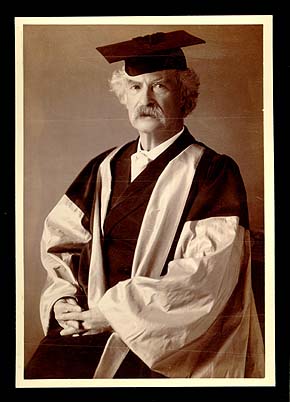The Books of To-day and the Books of To-morrow, July 1907
Some Tributes.
(A few from among the scores of telegrams received by Mr. Mark Twain since
his arrival in England.)
King Leopold wires: ‘Too busy to write. Hope you are and always will be.’
Mrs. Eddy wires: ‘Stay in England. In your case I prefer Absent Treatment.’
Frank Richardson wires: ‘Am sending you post-paid packet new Razorless Shaving Powder.’
Algernon Ashton wires: ‘Deeply interested in your remarks on your funeral. When it comes off may I have sole letter-rights in tomb?’
Mr. Hunnable wires: ‘Are you coming to Jarrow as a candidate, too? Plenty of room for all.’
Sir Henry Campbell-Bannerman wires: ‘I never say “Enough of your foolery.” ’
Mr. A. J. Balfour wires: ‘I have no Philosophic Doubt as to the merits of “Huckleberry Finn.” ’
Mr. Eustace Miles wires: ‘Much interested in your remarks about your funeral. Why not live on Plasmon and lentils, and postpone it indefinitely?’
Mr. Bernard Shaw wires: ‘Heartiest congratulations on seeing me so soon after landing.’
‘Z.’ (of Blackwood’s Magazine) wires: ‘Deeply sympathise with your bad luck in meeting Shaw at station. Awful thing to happen after tiring railway journey.’
M. Marcellin Albert wires: ‘If every one had your sense of humour, there would have been no Wine-growers’ Revolt.’
Winston Churchill wires: ‘I and the country welcome you.’
Sir A. Swettenham wires: ‘Glad you have come. I like some Americans.’
The Prince of Asturias wires (per pro his nurse): ‘Have read “The Jumping Frog” for the first time, and laughed so much that I turned bright purple. Everybody thought it was a fit. Such larks!’
Printed unsigned; entered by Wodehouse in Money Received for Literary Work.

Mark Twain made his last trip to England in June–July 1907 to receive an honorary Doctorate of Letters from Oxford University (a recognition also awarded to Wodehouse in 1939).
Some of the fictitious messages in this item were suggested by Twain’s own writings:
King Leopold of Belgium had been roundly criticized for his oppression and exploitation of natives of the Congo; Twain’s King Leopold’s Soliloquy (1905) purports to be the King’s own defense of his Congo rule, but Twain writes satirically as though exposing Leopold’s greed, racism, and selfishness through the King’s voice.
Mary Baker Eddy, the founder of Christian Science, also came in for Twain’s pointed pen in the 1907 book Christian Science. “Absent treatment” refers to the doctrine that a Christian Science practitioner need not be near the patient to have a beneficial effect.
Some of these relate to Twain’s reported remarks upon his arrival:
“I think this funeral of mine is going to be a great thing. I shall be there,” drawled Mark Twain to an interviewer yesterday. “I’m stopping for the Oxford pageant, and I guess I shall pick up a few hints from it. I only wish I could make it last six days,” he mused, ruefully. “It’ll be a showy funeral, with plenty of liquor for the guests. I shall issue invitation cards something like this: ‘The late Mr Mark Twain requests the pleasure of ——’s company. Mourning dress.’ ” (Hull Daily Mail, June 19, 1907)
Algernon Ashton: British composer (1859–1937) with an active hobby of writing letters to newspapers urging that the gravesites of distinguished persons be kept in repair.
Eustace Miles: British player (1868–1948) of real tennis, and a prolific author on food and health including Muscle, Brain, and Diet and Failures of Vegetarianism.
Other persons mentioned have little direct connection to Twain, but Wodehouse uses the event to make familiar points, such as lampooning Shaw’s and Churchill’s egos, or to mention other celebrated persons in the news.
For more on Frank Richardson, a comic writer whose theme was often whiskers, see the notes to “The Book-Hawkers” in Punch.
Arthur Hunnable was a bicycle maker and motor engineer who attempted to get elected to Parliament at a by-election in Jarrow in 1907, but failed to fulfill the legal requirements including a cash deposit. More of the story at Wikipedia.
Prime Minister Sir Henry Campbell-Bannerman had responded to a 1906 speech by the opposition leader, former Prime Minister Arthur James Balfour, with the simple dismissal “Enough of this foolery!” Balfour was trained as a philosopher; his 1879 book Defence of Philosophic Doubt was widely praised.
Marcellin Albert was one of the leaders of a June 1907 protest by southern French wine-growers against poor conditions, exploitation by wine merchants, and adulterated or fraudulent artificial wines, leading to widespread poverty among the farmers of grapes.
Sir (James) Alexander Swettenham had been British Governor in Jamaica when Kingston was nearly leveled by an earthquake on January 14, 1907. His rejection of an offer of American assistance caused an international incident and led to his resignation. More of the story at the Digging the Dust blog.
The infant Alfonso, Prince of Asturias, had been born on May 10, 1907, firstborn son of King Alfonso XIII and Victoria Eugenie of Battenberg (see “Thoughts on a Recent Wooing”) and thus was heir apparent to the throne of Spain. As it turned out, he never reigned, as Spain became a republic in 1931, and two years later he renounced his rights to the defunct throne to marry a commoner. Wodehouse portrays the infant in fun with precocious reading abilities, but notes that his nurse had to send the telegram on his behalf.
—Notes by Neil Midkiff
 Madame Eulalie’s Rare Plums
Madame Eulalie’s Rare Plums